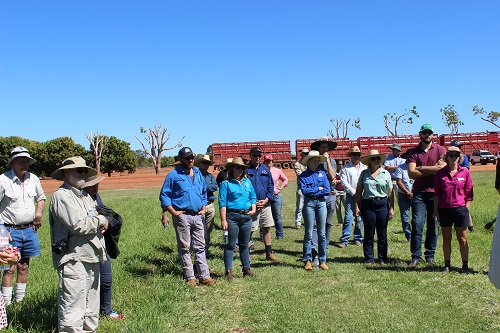
A big turnout of Kimberley and Pilbara pastoralists, agribusinesses and consultants took the opportunity to be updated on irrigated pastures at a recent industry field walk.
The Department of Primary Industries and Regional Development (DPIRD) hosted the field walk at the Skuthorpe trial site, east of Broome.
Senior development officer Chris Ham said the event was well attended with a mix of local pastoralists, irrigators, agribusiness, training providers and representatives from the Kimberley Pilbara Cattlemen’s Association (KPCA) and government agencies taking part.
“One of the morning’s highlights included a comparison of maize varieties, including fertiliser requirements and pest monitoring and management, with a key message being to plan ahead when growing maize, as it requires a high level of management,” he said.
“Maize is grown throughout the world for cattle feed due to potential for high yields and it can supply more energy in a ration than the sub-tropical grasses. However, maize has high nutrient requirements so it is attractive to insect pests, as well as being sensitive to moisture stress.
“The trial will help to measure the cost of the inputs required in comparison to the value of the final yield to determine the profitability of growing maize.”
Mr Ham said the group was also interested in learning more about the perennial sub-tropical grass variety trial, where biomass and feed quality across 10 different varieties was being compared.
“Our investigations into the nitrogen balance of Rhodes grass for sustainable production was another area of interest for participants,” he said.
“The industry update also included discussions on annual fodder crops, tropical legumes and farm biosecurity.
“Participants took the opportunity to ask questions and were keen to know the suitability of grasses for different purposes, like direct grazing or hay production and the nutrition levels expected from well managed stands.
“Other topics discussed included the fertiliser efficiency, how much water crops require and how it is measured, along with the best techniques to identify insect pests like fall armyworm.”
The development of the site and the ongoing research activities have been funded by DPIRD and Royalties for Regions Northern Beef Development program.
Image caption: There was a big turnout to hear about the irrigated pasture and fodder updated provided at the Skuthorpe industry field walk in Broome.


